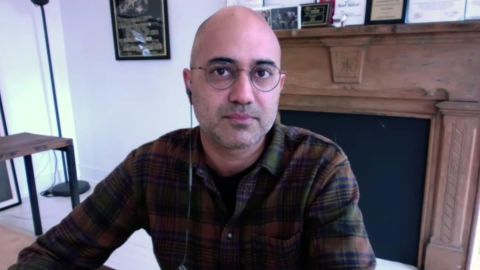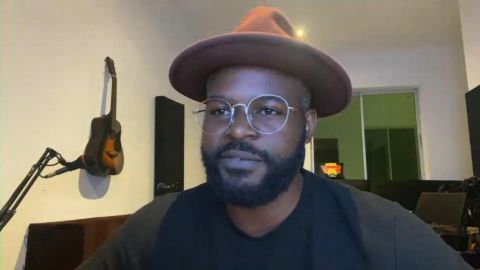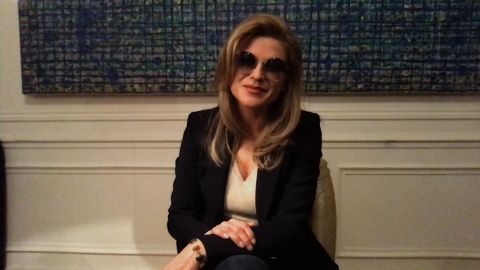Read Transcript EXPAND
CHRISTIANE AMANPOUR: Now, what it means to be American in both body and soul has been on our next guest’s mind for years. Playwright, Ayad Akhtar, won the Pulitzer prize in 2013 for his candid and thought-provoking play “Disgraced” on the identity crisis among Muslims after the 9/11 terror attacks. The conversation continues in his new book “Homeland Elegies,” part memoir, part novel, it looks at the immigration experience through a son’s relationship with his father who happens to support the anti-immigrant Trump. Here he is discussing this fraught family dynamic with our Hari Sreenivasan.
(BEGIN VIDEOTAPE)
HARI SREENIVASAN: Christiane, thanks so much. Ayad Akhtar, thanks for joining us. The narrator in this story is a Pakistani American with your name who also grew up in Milwaukee, who also happens to be a playwright, but this is definitely a novel.
AYAD AKHTAR, AUTHOR, “HOMELAND ELEGIES”: It is, if only because I wouldn’t know how to write a nonfiction memoir. I mean, I was so scared to — you know, to get canceled like James Springer or something like that because, you know, I’m compositing and, you know, collapsing events and I’m taking things from multiple time periods and I’m putting them into a 24-hour — you know, I’m doing what most dramatic writers do. And in the process of doing that, I kind of took so many liberties with the facts of, you know, sort of my parents and all of that stuff that I couldn’t really realistically call it a memoir. And plus, I think if I wrote a memoir and tried to be true to the facts, it wouldn’t be nearly as interesting as what I was able to hopefully create in a novel.
SREENIVASAN: Tell me what this book’s about.
AKHTAR: I mean, I think the way I’ve been describing it is that I wanted to tell the story of my parents and their generation of immigrants. They came over about half a century ago, 50 years ago. And what happened to them and their kids, meaning my generation, in the 50 years that they were here. And what that says about what America was to them when they came and then maybe what it became over the course of that time as told by one of their kids, myself, or the narrator who has my name in many facts of my life and who has written about them in the past and gotten in trouble with them. So there’s a little bit of there’s some hijinks there.
SREENIVASAN: So, this is the opposite of a tweet. This is the opportunity for you to lay out everything in hundreds of pages. I want to ask. There is a certain option here for readers that — to maybe punch through some of the noise that we’re always seeing, right? You’re publishing a novel like this at a time when our news cycle is so fast and furious, our alerts on our phones are always going off, and yet here you are trying to say, give me some space, give me some time.
AKHTAR: Yes. I mean, I think that’s that’s exactly what I hope the book is trying to do. It’s playing by that game of sort of ensnaring the reader’s attention with the breaking news obsessions and the Instagram scroll absorption, but it’s doing so in order — there’s all of the prurient, sort of sensationalist attraction in the book. But it’s doing so to provoke a deeper conversation, I think, ultimately about how to think about our country and what’s happened to our country. And by think, I don’t just mean intellectually thinking. I mean emotional thinking, because I think that literature at its best is something — it’s a kind of form of expression that is conditioned by emotional nuance, as well as intellectual precision.
SREENIVASAN: Yes, there’s a couple of big themes, for me, at least, as a reader, or a listener in this case for your audiobook. One was identity. And I want to read a quick passage about that. And you are — the narrator is explaining this to a billionaire friend at a bar, as we all do, of course.
(LAUGHTER)
SREENIVASAN: “We were outsiders. At least my parents were, because you know what? They came from somewhere else. That’s what outsiders are. And it didn’t bother them. There was a culture here. They had to learn. And they never really did, not the way those who are born into it do. “Don’t get me wrong, my father loves America, loves it more than makes sense to me sometimes, frankly. He thinks he’s American, but what that really means is that he still wants to be American. He still doesn’t really feel like one. It’s been 45 years, and he still doesn’t really understand what it means, because being American is not about what they tell you, freedom and opportunity and all that horse (EXPLETIVE DELETED), not really. “There is a culture here, for sure, and it has nothing to do with all the well-meaning nonsense. It’s about racism, and money worship, and, when you’re on the correct side of both of those things, that’s when you really belong.” What is the correct side of both of those things?
AKHTAR: Well, it’s important to remember the context of that conversation. He’s speaking to a billionaire. And it’s a chapter which is really about the predominancy of wealth in this country, as not only the expression of willpower excellence, the making money is the expression of willpower excellence, but also the kind of valorization of being. Wealth accords us in this country not only status and legitimacy. I think it’s, subliminally, the real reason that Donald Trump has any sway over the American people, is because we worship wealth in a way. But, also, wealth is the means to full citizenship. In order to really have an influence on the franchise and on the election, for example, it’s not your vote that matters as much as how much money you’re willing to donate. So, this is kind of a metaphor, I think, for the ways in which money has come to dominate American life in almost all ways. I mean, I think that we are increasingly customers to reality and less citizens of a republic. I think citizenship and civics have given away to consumerism. And that’s not a new story. But I think that it’s something that has gone so far that the consequences are now socially very widespread.
SREENIVASAN: So, that leads perfectly to a passage that I’d like you to read about the power of money.
AKHTAR: “Yes, money had always been central to notions of American vitality, but now it reigned as our supreme defining value. It was no longer just the purpose of our toil, but also our sport and our pastime. “We discuss a movie’s weekend gross before its plotline, an outfielder signing bonus before his batting average. The market had seeped into our language. We sought upside and minimized our exposure and worried about the best investment of our sweat equity. Even suffrage was monetized. True political power lay not in the ballot box, but in one’s capacity to write a check. “We were now customers first and foremost not citizens, and to buy was our privileged act. No longer ruled by a personified abstraction, Zeus or Yahweh, we now appeased a material one, the economy. We feared its humors. We were grateful for its dispensations. We tended to its imagined well- being with our ritual purchases. “When the economy was well, we were happy people. When the economy faltered, premonitions of doom were never far.”
SREENIVASAN: So, what do we lose as this shift is happening?
AKHTAR: Economic well-being cannot become the sole metric for human flourishing. We’re seeing this across universities, for example. When you have the only metric being cash flow coming into the coffers, then some of the more intangible pursuits, the humanities or philosophy, music, whatnot, begin to get cut. It’s what’s happening at the University of Wisconsin, a state that I know very well. But, when that happens, it’s not just that we’re losing — we’re losing something that we like. We’re losing something essential about being human. I mean, teaching children, for example, song is not just about giving them some imprint of the national anthem or whatnot. It’s about attunement to reality, to cadence, to rhythm, to being able to sing, to express openheartedly with others in a community. I mean, these are fundamental human capacities that we’re developing at early ages, which, because we don’t recognize their value on a spreadsheet, begin to fall by the wayside. What we’re going to see, I think, if we continue to let this happen, is something fundamentally impoverished about our societies and something that will ultimately have a significant economic impact, even though we can’t track it, obviously.
SREENIVASAN: What’s also interesting is the relationship that your narrator has with his father. I don’t know how much of this is true for your father in real life. But their notions of what success is when they came, so to speak, from the old country, and what they strove for, and how, in this case, the father in the story is aligned with the president to be and the president, Donald Trump.
AKHTAR: Well, in the first chapter, I tell the story of my father in the book, who — my real father was also a cardiologist and a specialist of arrhythmias and world famous and sort of treated a lot of dignitaries and whatnot. And in the book, he — in the middle of the ’90s, he is Donald Trump’s doctor very briefly and gets to know him a little bit then kind of becomes enamored with Donald Trump. And this is the reason why, in 2015-2016, he’s a supporter of the Trump campaign, even though there’s all kinds of egregious statements being made about Muslims and whatnot that should theoretically threaten his own citizenship or his own well-being in this country, but they don’t seem to. And it’s a way of sort of getting inside the intergenerational conflict, as well as the political conflict that has unfolded in this country, and also to try to tell a story that elucidates or brings out the kind of human dimension of an attachment to Trump.
SREENIVASAN: Because one of the things that you realize as you read this is that, so often, the kind of dominant narratives want to clump immigrants into a particular bucket. And that’s just not the case. I mean, we’re a pretty complex group of people. We are getting into a complicated relationship between a father and a son. They’re disagreeing on politics. This is not one lump sum voting bloc.
AKHTAR: Yes. I mean, it’s kind of an interesting paradox that those who would espouse the values of diversity don’t always share the constituents of that diverse cohort, right, that there are lots of left-leaning, capitalist-driven, ideological — ideologically right immigrants in this country. And in this book, my father is one of them. Yes, it’s an important — it was an important part of the story for me to tell.
SREENIVASAN: You use one of the characters in your book, Mike, and there’s sort of conversation about how, really, in a lot of ways, the left and the Democratic Party just forgot about a huge chunk of the country that was relevant to everyone else. And he’s speaking from kind of different voices. And you can pick whichever one you like. But what was the thing that you were trying to get across to the reader in that — in kind of the use of Mike and how basically, for him, he’s come to a — well, he’s come to a place where he can have pretty divergent viewpoints about certain things and still go sleep at night?
AKHTAR: Mike Jacobs in the book is a successful Hollywood executive who is someone who believes that bettering the life of his fellow black Americans is a top priority, and has come to the conclusion that paying taxes to a government built by whites is not something that he can countenance. And so it, paradoxically, leads to him voting for Republicans…
(LAUGHTER)
AKHTAR: … who make — who have endeavored to make life worse for black Americans. And that paradox is something that the narrator and him, he — they get into quite a bit of conflict over this, because they’re friends. I think Mike’s perspective, which is not a totally concocted perspective — I won’t say anything more about it than that — is something that I thought was important to include, because his analysis is very, very clear-eyed, a little cynical, but clear-eyed about — that the ways in which race and identity inform and shape economic decisions, and that, fundamentally, somebody like Mike, who sees the picture very clearly, recognizes that it really is all about money, and where the money you have, where you’re spending it, et cetera, et cetera. The Democratic Party, just to get back to the prelude of your question, moved to the right. They had to. Reagan was a transformative figure. Whether for good or whether for bad depends on your political point of view, but he was a transformative figure and changed the ideology of this country, enshrining, legislatively, as well as mythologically, the acquisition of personal wealth as a supreme American value. And so, in order to make a play for the political center, Clinton had to move to the right. And so it’s meant that the Democratic Party has moved to the right. And it’s also meant that Goldman Sachs, which is the sort of American global diplomatic corps when it comes to economic policy, has been in charge of economic policy, at the forefront of economic policy for two generations. So that’s — there’s a through line between Reagan and Obama that’s undeniable. There’s lots of variation there, but there’s a clear line that you can draw, and that line has moved away from the heartland, it’s moved away from locality, it’s moved away from the middle class, it’s moved away from industrial, it’s moved away from an economy that makes things, it’s moved away from any meaningful, helpful form of protectionism, all of those things under the guise of international competition.
SREENIVASAN: Going back a little bit to “Disgraced,” and that, if I can summarize your plan in 20 seconds, so we have got a Muslim man who, at a dinner party with his white wife, he’s fairly successful and affluent, a conversation turns to 9/11. And he basically exposes almost a moment of pride, and that kind of leads to this — the central tension that you throw on the audience. In this, it’s not really just the tension of that defining moment for Muslim Americans or Muslims all over the world. It really seems like it’s not just the towers falling. You’re talking about a man struggling with his entire country falling.
AKHTAR: Yes. No, that’s exactly right. I mean, I think the argument of the book, if you will, that begins with a kind of — a lecture that a college professor is talking about America and its legacy as a colony, where, in a way, the country is still defined by its own plunder, by its own citizens plundering the nation. And, in the book, I’m at the time barely 20 years old, and I don’t really understand what this professor is getting at. And I say that it took me 15 years to understand it, and that, even 9/11, and even the difficulties for Muslims and people in my family after 9/11 did not help me to understand better what had really happened in this country. It wasn’t until I started to see the larger picture of the suffering that all of us had been going through, that I started to get a picture of actually what had happened to America.
SREENIVASAN: Post-9/11, post-“Disgraced,” post a lot of the pushback and criticism that you have gotten in taking on these topics, in writing about how Muslim Americans may feel, what kind of kept your faith in the country, or has it been shaken so thoroughly that you are cynical now?
AKHTAR: No, I wouldn’t call myself cynical. I mean, I think I’m hopeful about life in this country, because I’m hopeful about my experiences with others that I have here. And I think — I come from Wisconsin, and I spent a lot of time still back in my home state. And I do love the state. I do love the community that I come from. I think, as an artist, as somebody who’s an outsider, by not just because of identity, but also because of chosen vocation, it’s my job to take a look at things and to sort of outline them, rather than to, I don’t know, celebrate, needlessly celebrate our greatness. I think the analogy — I often get the question, what country does it better, right? Well, why are you criticizing America? What country does it better? And when I get that question in Wisconsin, I always just turn to the Green Bay Packers, and I say, well, we have got a pretty good team. We have made it the NFC championships last year. But people had a lot of complaints about how Aaron Rodgers was calling plays and whether the head coach was dealing with Aaron Rodgers very well There were a lot of criticisms. You listen to talk radio, people had all kinds of opinions about — criticize — does that mean that we don’t love the Green Bay Packers, or that we’re not trying to make the Green Bay Packers a Super Bowl contender this year? It seems to me that the idea that somehow critiquing our country is some is — I don’t know, it’s not the patriotic? I don’t know. It’s certainly our generation, a younger generation who has had a different experience of America maybe than our parents have. The mythologies that they grew up with were mythologies that translated to real change, real experiences for them. Their lives got better. A lot of folks who were sort of my age and were really younger than me, their lives are not getting better. And so their experience of America is very different. So it stands to reason that they would have a more critical approach to it.
SREENIVASAN: Ayad Akhtar. The book is called “Homeland Elegies.” Thanks so much.
AKHTAR: Oh, thank you.
About This Episode EXPAND
Christiane speaks with Nigerian rapper Falz about the protests against state violence there. She also speaks with Republican National Committee spokesperson Liz Harrington about the final days of the presidential race. Hari Sreenivasan speaks with Pulitzer Prize-winning playwright Ayad Akhtar about his new novel. Jazz singer Melody Gardot speaks about creativity during a pandemic.
LEARN MORE



